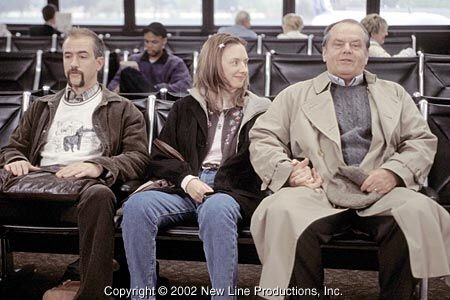« Ghost World (2001) – Movie Review | Home | The Vagina Monologues (2002) – Movie Review »
About Schmidt (2002) – Movie Review
By Robert L. Jones | December 21, 2002

Jack Nicholson is less than thrilled daughter Hope Davis brought home Dermot Mulroney and his ponytail, widow's peak, mullet, goatee, and Amway pitch
The Quiet Man
[xrr rating=4.5/5]
About Schmidt. Starring Jack Nicholson, Kathy Bates, Hope Davis, Dermot Mulroney, June Squibb, and Howard Hesseman. Screenplay by Alexander Payne and Jim Taylor. Based on the novel by Louis Begley. Directed by Alexander Payne. (New Line Cinema, 2002, Color, 125 minutes. MPAA Rating: R.)
Alexander Payne’s new movie, About Schmidt, opened in the Philadelphia area this Friday. I have been hearing about it since its limited run began, particularly on conservative talk radio, and some hosts and callers have dismissed it as “what happens when Hollywood makes fun of Midwesterners and Midwestern values.” Well, there’s some truth to that, but I don’t see the source so much as Hollywood, as much as a dead-on self-critique and reflection that could have only come from screenwriters who themselves are part and parcel of the Midwest plains states. Payne and co-scenarist Jim Taylor (who also co-wrote Citizen Ruth and Election with Payne) have made a masterpiece of a character study in finding out what makes stoic and enigmatic Warren Schmidt tick.
When I was in high school, I had an English teacher who introduced me to a writer who would become my favorite novelist, Sinclair Lewis. Main Street, Babbitt, and Arrowsmith accurately captured the plain-spoken and dry humor of the region, through Lewis’s naturalistic writing style. But Lewis was more than a recorder of the everyday people around him, he was a master of keen observation and insight, and seeing the quirky denizens of Zenith and Gopher Prairie through his eyes filled me as a reader with the sense of what I call the “inner adventure.”
What Lewis had going for him as a novelist, Alexander Payne has as a moviemaker: The same sense of wry observation, absurd humor that arises out of awkward and painful situations, and biting social commentary that never wallows into the territory of judgmental didacticism. To me, Jack Nicholson’s portrayal of Warren Schmidt is, like Main Street’s Carol Kennicott, an angry loner, dissatisfied with the world around him. But, whereas Main Street follows Carol out of college and into a stifling marriage—in which she can only survive by suppressing her innate romanticism and adventurism—About Schmidt catches its tragicomic hero at the tail end of his life, after decades of lonely emotional withholding have dried up the once puissant earnestness and ambition he once had. He lives his life, as Thoreau penned, “in quiet desperation.”
I agree with many, however, who have said, “I don’t know what to make of this movie.” Not that I don’t know what to make of it, but I agree that they don’t. There are many times when Nicholson just keeps a stiff upper lip, and tries sailing through awkward situations by responding with pained silence. And, although some genuine humor came out of some of those scenes, such as scenes in an R.V. park, and one scene in the hot tub with Kathy Bates, many of the theatergoers in attendance laughed at each and every one of his silences, as if on cue, or as if waiting or expecting to be prodded. It is something I first picked up on when seeing Hitchcock’s 1964 flawed classic Marnie at an Austin theater a few years ago, that people break out into nervous laughter during awkward or silent moments. It is a discomforting thing for people to have to face, and stirs the reflexive reaction of the viewer to equally awkward giggling or laughter, rather than having to face the protagonist’s silence with their own. Of course, as allegedly “passive” participants, it is unintentional on their part.
Yet, the ending to About Schmidt (which I won’t give away) was a poignant and cathartic moment, but is the only moment when catharsis is permitted the viewer, inasmuch as we the viewers are handed a veritable table of permissible emotions. Up to that point, Schmidt is a repressor, and likewise viewers repress any honest emotional response to his character. That’s where Payne really got his point across, in spades: It was just as interesting listening to the audience reactions as it was watching Payne’s characters on the screen acting out theirs.
As for the movie as a whole, I enjoyed it thoroughly, and was both entertained and enlightened. The supporting cast was excellent, though two-dimensional. This is by design, because we are viewing these offbeat people through the subjective eyes of Warren Schmidt. Dermot Mulroney as the loutish, Amway-pushing son-in-law-to-be is perfect casting, with his annoying ponytailed mullet, widow’s peak, porkchop sideburns, and cheesy goatee. Howard Hesseman and Kathy Bates also liven the cast with their aging-hippie-cum-white-trash characterizations. I especially enjoyed the hot tub scene with a nude Kathy Bates. It took a lot of courage for Payne to do that, because Bates is overweight, aging and doesn’t fit the image what the fashionistas tell us is beautiful. But lemme tell ya, she is one beautiful woman, and exudes so much self-assuredness and expressiveness. I hope some able sculptor poses her for a Venus statue. It would be much more alluring and fascinating than one of any of the current crop of starved waifs Us magazine tries to ram down our throats.
Another nice touch is using Erik Satie’s Gnossiennes in the soundtrack. Any other director would have used something more obvious, such as Debussy or even Chopin to convey Warren Schmidt’s overwhelming sense of solitude and irresolution. Satie’s music melds seamlessly and beautifully with Nicholson’s onscreen solitary wanderlust.
About Schmidt is not Payne’s funniest movie (Election wins that, hands down) nor his most satirical (Citizen Ruth pushes the envelope a lot farther than this one). However, through Warren Schmidt’s journey into the undiscovered self, Payne has crafted a masterpiece of understated comedic drama on par with Woody Allen’s Crimes and Misdemeanors or Wes Anderson’s Rushmore.
Robert L. Jones is a photojournalist living and working in Minnesota. His work has appeared in Black & White Magazine, Entrepreneur, Hoy! New York, the New York Post, RCA Victor (Japan), Scene in San Antonio, Spirit Magazine (Canada), Top Producer, and the Trenton Times. Mr. Jones is a past entertainment editor of The New Individualist.
Topics: Comedies, Independent Films, Movie Reviews | Comments Off on About Schmidt (2002) – Movie Review
